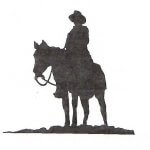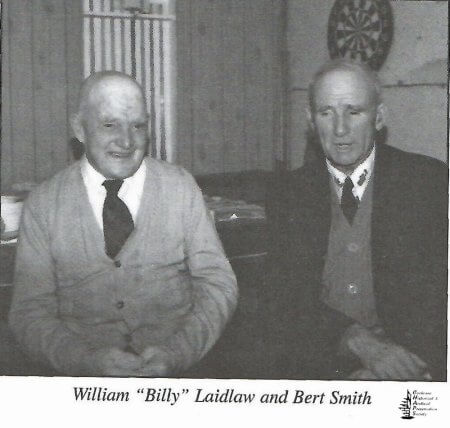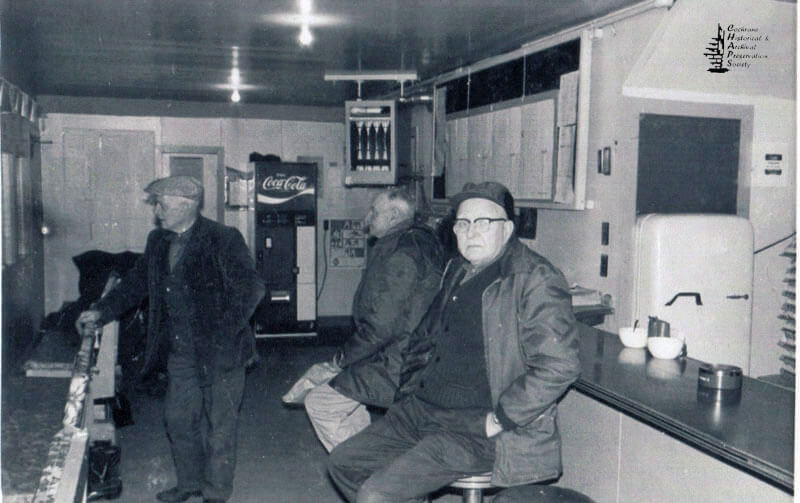William Joseph Billy" Laidlaw pg 556 More Bill Country 1994
William’s (Billy) parents, Joseph Keith and Jane Laidlaw were born near Edinburgh, Scotland. They travelled to Canada in 1892, settling west of Carstairs, where they worked on the Hickling Ranch. Several years later they moved south to homestead. They chose a site at the north end of a lake and Joseph named it Lochend, meaning lake’s end. The original property can now be reached by travelling 12 miles north of Highway 1A on Lochend Road.
Billy was born in Cochrane in 1904 in “a little log house that was somebody’s private residence.” The building served as a hospital and stood where the Grahams Pharmacy building now stands. Mrs. Dicky Smith was the midwife at his birth.
Some of Billy’s earliest memories are of school. However, there was no school in Lochend when Laidlaw’s first moved there. The first public building to be built was a church. Then in 1912, the Lochend area experienced rapid growth making the school a necessity. A decision was made to use the church as a school during the week. This caused hard feelings among the older folks, who objected to the church being used in this manner. However, classes commenced for grades 1 through 8. Only one teacher was required for the 15 pupils who attended. Usually, the teacher only stayed one year. The only way the government could get teachers to teach at rural schools was to require them to do so for their certification. When one year was up most moved to schools in Calgary or other towns. Billy remembered that in winter, it was not uncommon for one or two adults to attend school with the children. These were people who had never received any formal education but were eager to improve their reading and writing skills.
The Laidlaw ranch encompassed two sections straddling the Lochend Road. The buildings were constructed of logs and were clustered at the north end of the lake. The family home served as the post office for many years. Billy worked on the ranch from an early age but did have an aptitude for mechanics. He was offered a job working at Chapman’s Garage in Cochrane, but he decided to stay on the ranch.
He remembered the depression years, how grain prices tumbled after the boom period following WWI. At one point farmers received $0.34 a bushel for wheat, cattle sold for $2.75 a hundredweight and a front quarter could be purchased for $0.05 a pound. Cochrane was not hit as hard as some communities that relied solely on grain sales. Cochrane had always enjoyed a mixed farming economy. Also, Cochrane had a creamery that provided an outlet for milk production. In many cases, the only money with which farmers could buy groceries was earned from the sale of milk.
Cochrane also had the Clark Butcher Shop. Andy Clark’s shop sold a lot of meat and eggs to restaurants and hotels in Banff. This gave Cochrane area farmers and ranchers an outlet for their produce.
As years passed the Lochend community petered out. Many young people moved away to homestead on their own. Some properties were purchased by ranchers wishing to enlarge their holdings. A few properties were lost when young couples were unable to pay their mortgage. But through all this Billy remained. He was never married. When asked why he replied that he had never been much interested in girls. He also named several young people who grew up in the Lochend area who never married. He concluded that for some reason, Lochend was not a “marrying district.”
In 1953, Billy purchased a lot on Pope Avenue in Cochrane and set up a small house. On and off he did live in this house but mostly rented it out to various people until in 1970 he decided to retire. He sold part of his ranch to the Williamson family who had worked for him. Williamsons’ rented the remainder of the land. After working hard all his life, Billy found retirement didn’t really suit him, so he would go out to help on the ranch whenever he could. Then for a few years in the winter, he took on the job of caretaker of the Cochrane Curling Rink that was on the main street next to the United Church. Looking back on his life, Billy considered himself pretty lucky. He was surprised to think of all the changes he had seen over the years, but he had no complaints. He felt that life had been pretty good. Billy Laidlaw passed away in July 1986 and rests in the Cochrane Cemetery.




